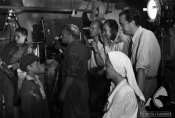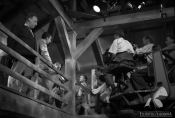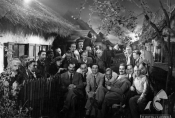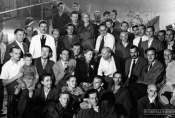Eugeniusz Cękalski
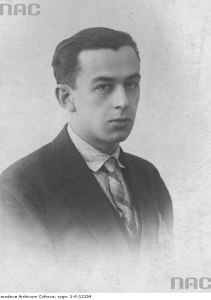
Director of feature films and documentaries, screenwriter, cinematographer, editor, producer, educator, film theorist, journalist and translator. He was born on December 30, 1906 in Saratov, died on May 31, 1952 in Prague. Until 1918, he lived in Russia. After the death of his father, he moved with his mother and sisters to Poland (Krasnystaw). He studied Polish literature at Warsaw University and at Aleksander Zelwerowicz’s School of Drama. He graduated from the Department of Drama at the National Conservatory of Music in Warsaw (1926).
Before he become involved in the film industry, he used to write for magazines such as "Kwadryga", "Kino", or "f.a.”. In 1930, together with Wanda Jakubowska, Jerzy Toeplitz, Stanisław Wohl and Jerzy Zarzycki, he founded the Association of Art Film Lovers “Start” in Warsaw to promote socially useful art-house films; Cękalski was its first president. Before the war, he became involved with the Association of Short Film Producers (1933) and the Film Authors Co-operative (1937). His directorial debut was a feature film, Dróżnik nr 24 /The Station Agent No. 24 (1928). Later, Cękalski took up making documentaries. One of them, Trzy etiudy Chopina/ Three Etudes by Chopin (1937), received accolades at the Venice Biennale. In 1938, together with Karol Szołowski, he made Strachy/Spooks, a successful film adaptation of the popular novel by Maria Ukniewska. The production of his next feature film, Przygody pana Piorunkiewicza /The Adventures of Mr. Piorunkiewicz, based on the novel by Tadeusz Dołęga-Mostowicz, was interrupted by the war.
After the outbreak of the war, he was the head of the Film Bureau of the Polish Government in exile in France, and then in the UK and the U.S., where he was the head of the film department of the Polish Information Centre. He made documentaries, including Biały orzeł /The White Eagle (1941, Oscar nomination), featuring voiceover by Leslie Howard, Dziennik polskiego lotnika/The Diary of a Polish Airman (1942), Szkocki mazurek/ Scottish Mazurka (1943), Niedokończona podróż/The Unfinished Journey (1943), dedicated to the memory of General Władysław Sikorski, Mistrz Paderewski/Master Paderewski (1943), Marynarz polski – dzieje przeciętnego człowieka/A Polish Sailor – The Life Of An Average Man (1943), Trzy etiudy Chopina/ Three Etudes by Chopin (a 1944 remake of his 1937 film), Dzieci na wygnaniu/Children in Exile (1944), Mary odwiedza Polskę/Mary Visits Poland (1945), Odbudowa Warszawy/Reconstruction of Warsaw (1946), Przeżyliśmy /We Have Survived (1946), Polska – kraj i ludzie/Poland – the Country and the People (1946). After returning to Poland, he shot more documentaries: Nasze Ziemie Zachodnie/Our Western Lands (1947), Żelazowa Wola (1948, awards in Bahia and Rio de Janeiro), Akcja Narodów Zjednoczonych/The United Nations Operation (1948), and Feliks Dzierżyński/Felix Dzerzhinsky (1951). He also took up teaching. In 1948-1952, he was the first dean of the Faculty of Directing of the State Film School in Łódź. He wrote several textbooks and books on film theory, such as ABC filmu/Introduction to Film (1932), Awangarda filmowa/ Film Avant-Garde (1934). After the war, he made only one feature film – Jasne Łany/Bright Fields (1947), a socialist realist propaganda story about electrification and a young, energetic teacher who goes to the countryside to bring “the torch of education” there, so that “dark Fields could be turned into bright ones”. He was also the artistic supervisor of the film Dwie brygady/Two Brigades (1950), a collective work of a group of filmmakers and a Polish socialist realism film classic, which actually won an award for best experimental film at the Karlovy Vary film festival; the jury's verdict read, “in a novel way, [the film] shows how new art is born out of the cooperation of artists and workers, resulting in a more perfect socialist working relationship.”
Jerzy Armata
Selected filmography
-
1938
SPOOKS
